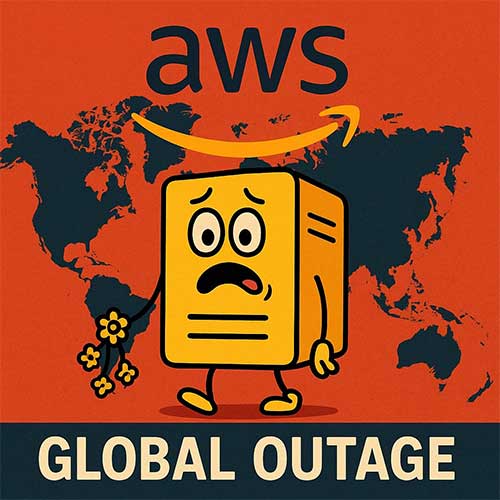
A major global outage on Monday disrupted Amazon Web Services (AWS), sending shockwaves across the digital economy and underscoring the world’s growing dependence on a few cloud giants. The disruption caused widespread connectivity failures for hundreds of major applications and websites—including Amazon Prime, Perplexity, Fortnite, Alexa, Snapchat, Duolingo, Robinhood, Signal, and Delta Air Lines. According to data from Downdetector, thousands of users around the globe reported sudden service interruptions, while other popular platforms like Reddit, Disney+, and PlayStation also suffered outages.
AWS confirmed that the issue originated in its US-EAST-1 region, one of its largest and most critical data hubs. The technical failure triggered elevated error rates across multiple cloud services used by businesses, developers, and consumers alike. Though AWS managed to restore most services by late morning, the incident disrupted digital operations worldwide—from streaming entertainment to online banking—bringing key sectors to a standstill.
Cybersecurity experts have raised alarms that such large-scale cloud outages expose dangerous single points of failure. “Mass disruptions like this create a perfect opportunity for hackers to exploit confusion and weakened defenses,” warned Marijus Briedis, CTO at NordVPN. He noted that organizations heavily dependent on one cloud provider are particularly vulnerable to cascading effects during outages. Analysts also highlighted that when services go offline, users may turn to insecure backup systems or hastily deploy unverified fixes—conditions that cybercriminals can easily exploit.
Security specialists are now urging companies to back up sensitive data, enable multi-factor authentication, and maintain vigilance for phishing campaigns that often follow major service interruptions. These proactive steps, they argue, are critical for mitigating potential follow-up cyberattacks.
The outage also rattled investor confidence, with Wall Street analysts warning of potential ripple effects across the S&P 500 and global financial markets, given AWS’s integral role in e-commerce, fintech, logistics, and communication networks. The incident coincides with mounting geopolitical cyber tensions, as China recently accused the U.S. National Security Agency (NSA) of hacking its national time center—an attack Beijing claimed could have disrupted its communications and financial infrastructure.
Industry leaders agree that this latest AWS failure serves as a wake-up call: digital security must extend beyond preventing hacks to include comprehensive resilience strategies. As reliance on cloud computing intensifies, both organizations and consumers must plan for not only cyberattacks but also systemic outages—ensuring that the world’s digital backbone remains strong, secure, and resilient.
See What’s Next in Tech With the Fast Forward Newsletter
Tweets From @varindiamag
Nothing to see here - yet
When they Tweet, their Tweets will show up here.





























